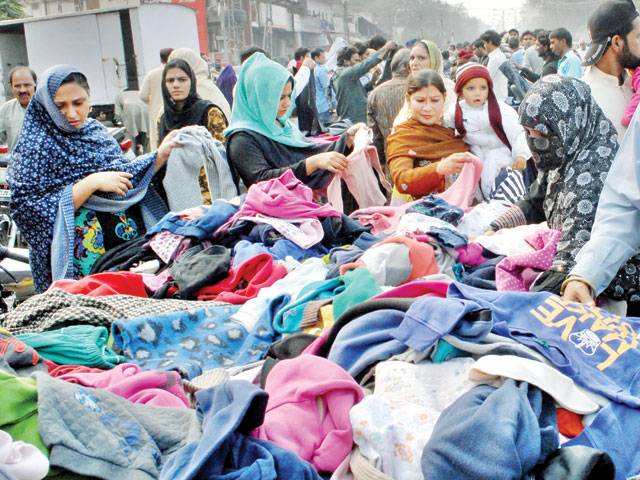LAHORE - Winter has set in early this year reportedly mainly due to unusual rains and snowfall upcountry.
Meteorological Department Director General Ghulam Rasool told The Nation yesterday that it was a westerly wave that hit parts of Balochistan, upper Punjab, AJK, Gilgit Baltistan and KP. “This wave will continue for four or five days. After that there are chances of more rainfall in plains and snowfall in the mountains,” Rasool explained.
Environment Protection Department Director Nasimur Rehman blamed the smog for pollution in the city. “This is all due to climate change. Smog and fog mixture produces smoke condition that you are getting on your cell phones data. This is what happening and it may not be good for health,” Rehman was of the view.
While smog continues to engulf city throughout the day the advent of winter seasonal businesses have started. The sale of warm clothes, heaters, geysers and dry fruit has picked up and so has the increase in prices of these and many other items like bakery products, fried fish and soups being sold at road side stalls.
When contacted, a City District Government Lahore official said administration did not have any price control mechanism to monitor winter related products’ business since these were not on the “list of essential items”. Spokesman Imran Maqbool did not know about the mechanism to check prices of these products.
For those who can afford it is fine but the rush of majority of low and middle income people is for second hand clothes being sold at Landa Bazars near railway station, Mayo Hospital, Empress Road, Mughalpura, Ichra, Baghbanpura, Chah Miran and Bhati Chowk. The rush is because with the passage of time the prices would go up further. Already the prices are more than they were for the same items last year.
They say bargaining is the key word while shopping. But whatever the bargain it is the user or consumer who goes in loss. Arslan Daud, a student of Garrison University was at Mayo Hospital Landa Bazar. He wanted to buy a jacket but had failed to do so. “My budget is only Rs 1500. But good quality jackets are available for Rs 2500 to Rs 4000. I am looking around and hopefully will find it within my range. Otherwise I will have to go to Landa Bazar near Railway Station,” Arslan said.
“Low quality sweater is available at Rs100 while quality warm clothes in this category are available for Rs1000 to Rs 2,000 per piece; coat Rs 400 to Rs 3,000; and a two piece suit is available in the range of Rs 3,000 to Rs10,000. If you want branded second hand clothes they are expensive,” shopkeeper Rahim Shah said.
Housewife Saira Nawaz, resident of Muhammad Nagar, who was shopping for her school going children, said the prices were higher than last year. I will not be able to buy all the clothes that I want because of budget constraints as we had to pay their school fees this month,” Saira said.
Muhammad Ali, salesman at a garments shop in Panorama Centre, said the business of newly stitched readymade garments has decrease in recent years. “People do not have the buying power,” he added.
The prices of heaters and geysers have also increased. Haji Saleem, manufacturer electric and gas geysers in Kot Khawaja Saeed area, said they were compelled to increase prices because of unusual increase in the price of raw material prices and the raise in electricity and gas tariffs.
“Prices of almost all the metal items such as iron, silver, brass and copper increased by 10 to 20 percent as compared to last year,” Saleem said. He said locally manufactured heaters, geysers and cooking range are expensive but more durable as compared Chinese products, which are cheaper.
“Quality gas heater is available between the range of Rs 5,000 to Rs 7,000, while an average quality geyser price range is Rs 8,000 to 11,000 while prices of branded geysers start from Rs 15,000 to Rs 25,000 this season, which are 10 to 20 percent higher than last year.
Customers at Akbari Mandi have been complaining that the prices of pinecone, pine nuts, almonds, walnuts, cashews, pistachios, hazel nuts and apricots are skyrocketing and there is no price control mechanism.
Retailers are selling pinecones and nuts from Rs1,400 to Rs2,000 per kg; cashew nuts from Rs1,000 to Rs1,100 per kg; almonds from Rs1,200 to 1,600 per kg; apricot nuts from Rs1,000 to 1,200/kg; peanuts from Rs190 to 240 per kg; and pistachios at Rs1,400 per kg. Wholesale dealer, Mian Shakoor, said that prices were higher because most of these dry fruits were imported from other countries like Afghanistan, Iran and China. Pine nuts, pistachios and cashews are on top among the pricy dry fruits while peanuts, dry grapes and dry apricots are considered ‘low-price’ items.
Thursday, April 18, 2024
Temperature down, prices up

Tobacco usage declines after decision on high taxes
April 18, 2024
Enemies of Pakistan are unable to digest investment in the country: Ataullah Tarar
1:29 PM | April 18, 2024
IHC restores Bushra Bibi's appeal for shifting to Adiala Jail from Bani Gala
1:24 PM | April 18, 2024
Hepatitis Challenge
April 18, 2024
IMF Predictions
April 18, 2024
Wheat War
April 18, 2024
Rail Revival
April 17, 2024
Addressing Climate Change
April 17, 2024
Justice denied
April 18, 2024
AI dilemmas unveiled
April 18, 2024
Tax tangle
April 18, 2024
Workforce inequality
April 17, 2024
New partnerships
April 17, 2024
ePaper - Nawaiwaqt
Advertisement
Nawaiwaqt Group | Copyright © 2024





